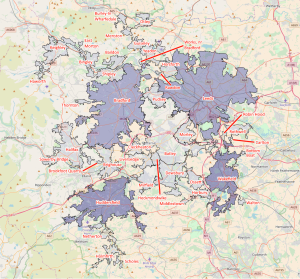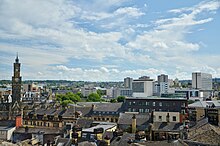West Yorkshire Built-up Area
| West Yorkshire Built-up Area | |
|---|---|
 2011 West Yorkshire Built-up Area map | |
| Area | 487.8 km2 (188.3 sq mi) |
| Population | 1,777,934 |
| • Density | 3,645/km2 (9,440/sq mi) |
| OS grid reference | SE455215 |
| Metropolitan county | |
| Region | |
| Country | England |
| Sovereign state | United Kingdom |
| Police | West Yorkshire |
| Fire | West Yorkshire |
| Ambulance | Yorkshire |
The West Yorkshire Built-up Area, previously known as the West Yorkshire Urban Area is a term used by the Office for National Statistics (ONS) to refer to a conurbation in West Yorkshire, England, based on the cities of Leeds, Bradford and Wakefield, and the large town of Huddersfield. It is the 4th largest urban area in the United Kingdom. However, it excludes other large towns and suburbs such as Castleford, Pontefract and Wetherby which, though part of the county of West Yorkshire and often contiguous with the built-up area, are considered independently. There are substantial areas of agricultural land within the designated area - more than in any other official urban area in England - many of the towns and cities are only just connected with one another by narrow outlying strips of development.






Urban subdivisions
The ONS gives the conurbation a population of 1,777,934 (2011 census),[1] which makes it the fourth-most populous in the UK. The ONS partitions the area down into 39 sub-divisions:[1]
- Baildon
- Batley
- Bingley
- Bottom Boat
- Bradford
- Brighouse
- Burley in Wharfedale
- Carlton
- Cleckheaton
- Dewsbury
- East Morton
- Guiseley
- Halifax
- Haworth
- Heckmondwike
- Holmfirth
- Horbury
- Horsforth
- Huddersfield
- Keighley
- Leeds
- Liversedge
- Menston
- Middlestown
- Mirfield
- Morley
- Netherton
- Ossett
- Otley
- Pudsey
- Robin Hood
- Rothwell
- Scholes
- Shipley
- Sowerby Bridge
- Thornton
- Wakefield
- Walton
- Yeadon
Three further subdivisions are given[2] with no population numbers as they are present or former industrial areas with no resident population.
Rawdon is the subdivision name for Horsforth Vale, on which a former industrial plant was redeveloped for housing from 2010, too late to be recorded for the 2011 census.
- Brookfoot Quarry (Marshalls Southowram)
- Esholt Water Treatment plant, named 'Works, nr Bradford' by the ONS
- Rawdon
Note that the areas below do not have exactly the same borders in each census, so the numbers are not always comparable (e.g. what was classified as Lofthouse/Stanley in 2001 was classified as part of Wakefield in 2011).
| # | Subdivision | Population 2011 | Population 2001[3] | Population 1991[4] | Population 1981[5] |
|---|---|---|---|---|---|
| 1 | Leeds | 474,632 | 443,247 | 424,194 | 445,242 |
| 2 | Bradford | 349,561 | 293,717 | 289,376 | 293,336 |
| 3 | Huddersfield | 162,949 | 146,234 | 143,726 | 147,825 |
| 4 | Wakefield | 99,251 | 76,886 | 73,955 | 74,764 |
| 5 | Halifax | 88,134 | |||
| 6 | Batley | 80,485 | 49,448 | 48,030 | 45,582 |
| 7 | Dewsbury | 62,945 | 54,341 | 50,168 | 49,612 |
| 8 | Keighley | 53,331 | 49,453 | 49,567 | 49,188 |
| 9 | Brighouse | 33,286 | 32,360 | 32,198 | 32,597 |
| 10 | Pudsey | 32,216 | 32,391 | 31,636 | 31,943 |
| 11 | Morley | 29,673 | 54,051 | 47,579 | 44,652 |
| 12 | Shipley | 28,694 | 28,162 | 28,165 | 28,815 |
| 13 | Bingley | 22,493 | 19,884 | 19,585 | 18,954 |
| 14 | Holmfirth | 21,706 | |||
| 15 | Ossett | 21,231 | 21,076 | 20,405 | 20,417 |
| 16 | Yeadon | 19,668 | |||
| 17 | Rothwell | 19,512 | |||
| 18 | Mirfield | 19,330 | 18,390 | 18,459 | 18,599 |
| 19 | Horsforth | 18,895 | 18,928 | 18,593 | 19,205 |
| 20 | Liversedge | 17,697 | |||
| 21 | Baildon | 15,944 | 15,368 | 15,385 | 14,907 |
| 22 | Otley | 14,215 | |||
| 23 | Heckmondwike | 12,085 | 11,291 | 9,855 | 9,775 |
| 24 | Guiseley | 11,960 | |||
| 25 | Cleckheaton | 11,648 | |||
| 26 | Horbury | 10,361 | 10,002 | 9,186 | 9,792 |
| 27 | Burley in Wharfedale | 7,041 | |||
| 28 | Haworth | 6,379 | |||
| 29 | Thornton | 5,289 | |||
| 30 | Sowerby Bridge | 4,601 | |||
| 31 | Menston | 4,369 | 4,660 | 4,888 | 4,865 |
| 32 | Netherton | 3,686 | |||
| 33 | Robin Hood | 3,573 | |||
| 34 | Walton | 3,231 | |||
| 35 | Middlestown | 2,366 | |||
| 36 | Scholes | 2,317 | |||
| 37 | Bottom Boat | 1,169 | |||
| 38 | East Morton | 1,169 | |||
| 39 | Carlton | 842 | |||
| Guiseley/Yeadon | 31,381 | 31,104 | 30,811 | ||
| Cleckheaton and Liversedge | 26,796 | 27,151 | 26,340 | ||
| Lofthouse/Stanley | 22,947 | 19,136 | 17,439 | ||
| Holmfirth/Honley | 22,690 | 21,979 | 21,138 | ||
| Queensbury | 8,718 | 7,424 | 7,410 | ||
| Shelf | 4,496 | 4,237 | 4,204 | ||
| New Farnley | 2,548 | ||||
| Total | 1,777,934 | 1,499,465 | 1,445,981 | 1,467,412 | |
2011 subdivision notes:
Lofthouse merged into Wakefield.
Stanley merged into Wakefield.
Honley merged into Holmfirth.
Queensbury and Shelf merged into Bradford.
New Farnley merged into Leeds.
References
- ^ a b "2011 Census - Built-up areas". ONS. Retrieved 5 July 2013.
- ^ "West Yorkshire BUA". statistics.data.gov.uk. ONS. Retrieved 24 October 2017.
- ^ "Census 2001: Key Statistics for urban areas in England and Wales" (PDF). Archived from the original on 5 January 2016.
{{cite web}}: CS1 maint: bot: original URL status unknown (link) - ^ "1991 Urban Areas". Archived from the original on 18 July 2006.
{{cite web}}: CS1 maint: bot: original URL status unknown (link) - ^ Census 1981 : key statistics for urban areas : the North, cities and towns. Great Britain. Office of Population Censuses and Surveys. London: H.M.S.O. 1984. ISBN 0116910615. OCLC 10979725.
{{cite book}}: CS1 maint: others (link)
